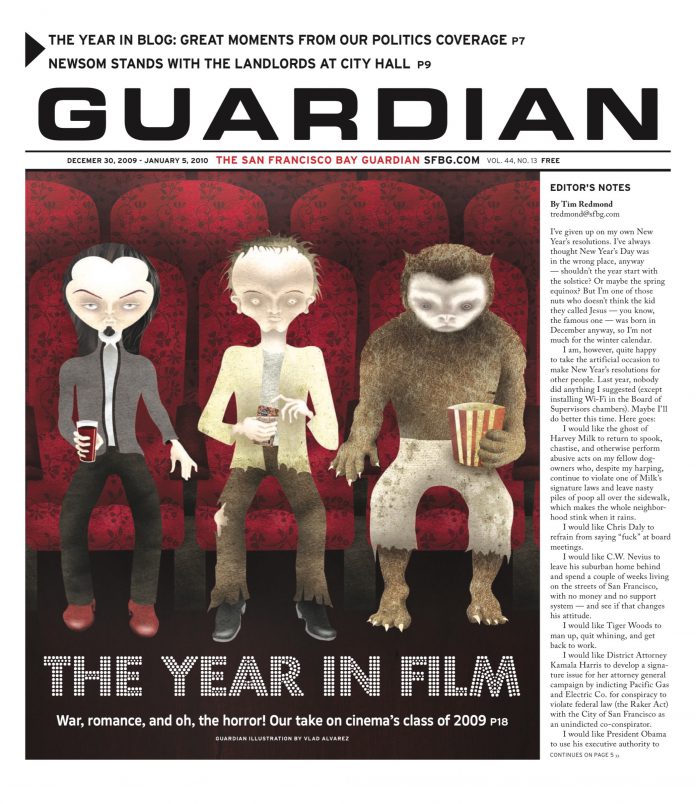YEAR IN FILM The defining adjective for Woody Harrelson is hard to pin, but I’d nominate … limber. Not just because he’s a deft physical comedian — in The Late Henry Moss, a star-encrusted but not very good Sam Shepard play that premiered in San Francisco in 2000, he stole the show from the likes of Sean Penn, Nick Nolte, and Cheech Marin with a 20-minute bit as a cabbie stuck in a front door. But also because he undergoes gymnastic changes from one screen role to another without ever seeming to break a sweat, or lose
his essential congeniality.
He appears to be a laid-back guy, and he’s a certainly a laid-back actor — one never sees the heavy Actor Man gears rotating (unlike with Sean Penn). It all seems to be pure pleasure and/or instinct. Maybe because he makes it look so easy — and because he’s so good a goofball — Harrelson has seemed kinda taken for granted, a guy who lucked out in TV (Cheers), then movies. He’s had a haphazard career by the usual upwardly-mobile standards, mixing leads, support parts, cameos, mainstream and indie projects, network guest spots, heavy drama and low comedy. One suspects he takes work because he likes the people involved or it sounds like fun. No wonder he’s not the possessor of a screen image as carefully calibrated (and, at least until recently, lucrative) as Tom Cruise.
I’m sure there was no intentionality involved — dig the randomness of his 2008 output — but 2009 turns out a year that insisted attention be paid. Closet Harrelson fans (why would you hide that love?) emerged. How could they not? His conspiracy theorist was the sole spontaneous note in humungous idiot’s-delight 2012. He gave the sublime Steve Zahn a run for his scene-owning money in undervalued indie flop Management, as principal rival for Jennifer Aniston’s affections.
More significantly, he ruled as brokenhearted macho blowhards in two wildly different films. In Zombieland, his joyriding undead hunter has gorgeous comic rapport with Jesse Eisenberg’s shambling teen coward, improving their material considerably. That surprise box-office triumph was followed by underachiever The Messenger, in which Harrelson plays the officer who trains-partners Ben Foster in the terrible task — considered by many the military’s worst job — of informing home-front families their loved ones
have been killed.
Harrelson’s role in that was sarcastic, hostile, loutish, hilarious, tender, tragic — a tribute to director-coscenarist Oren Moverman, for sure, but especially to the actor he rightly figured as best possible choice. It’s a beautiful performance. But in a toss-up between that and Zombieland, I’d be hard-pressed to choose a favorite.
Yet even those movies don’t let Harrelson dominate as in Defendor, a 2009 Toronto International Film Festival premiere not due theatrically until next year. In that, he plays a near-homeless schizophrenic who imagines himself a superhero. That tricky role brings out nearly all his colors, especially the loopy, athletic, and pathos-driven ones.
It’s another small film in a career whose highlights are often under-the-radar, like his gay Southerner escort to Manhattan socialites in 2007’s The Walker; the quiet hired gun in 2007’s No Country For Old Men; guess-who in 1996’s The People vs. Larry Flynt; the grenade recipient in 1998’s The Thin Red Line; and so forth. Not to mention such funny-farm swerves as Natural Born Killers (1994), Kingpin (1996), Wag the Dog (1997), and (in drag) Anger Management (2003).
To his credit, Harrelson has also been a high-profile spokesman for hemp, veganism, and overall greening. At his Mill Valley Festival tribute in October, he was charmingly abashed by his own success and serious about attributing achievement to others. All this overcoming a most unfortunate familial background fictionalized in fellow-Texan-turned-local-playwright Octavio Solis’ brilliant Santos & Santos.
Will he age out? Unlikely — already straddling Steve Buscemi and Matthew McConaughey terrain, he can be our next Jeff Bridges for another 30 years.

